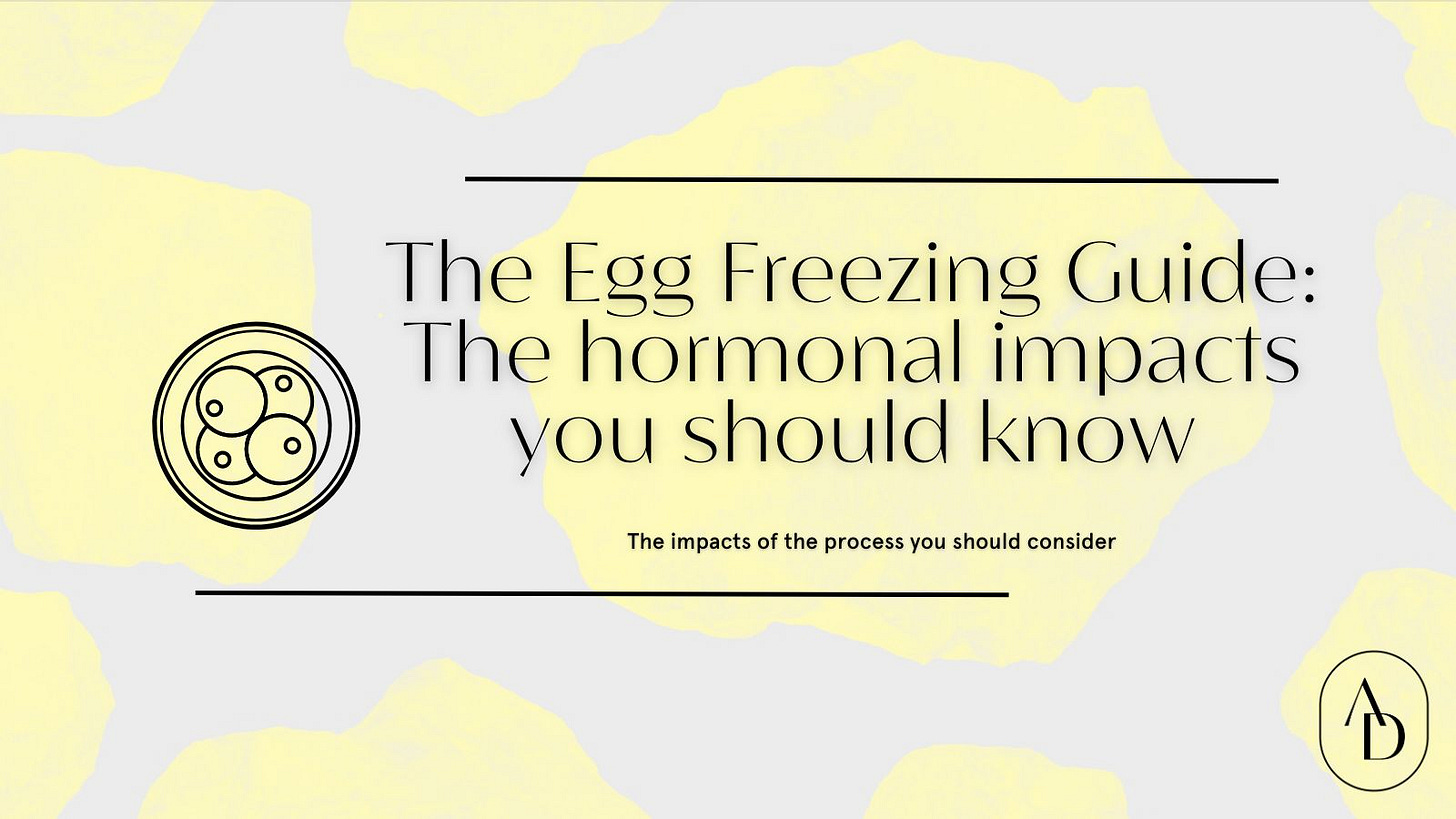Hello 👋 and welcome to AthenaDAO’s newsletter where we explore women’s health at the intersection of research, tech, and web3. 🪩
Data and medical information were checked by our lead OB-GYN Dr. Melissa Walsh.
🥚 What happens to your hormones after the egg freezing process is complete?
After completing this process, the hormonal changes in a person's body return to their normal state over time. However, hormones are impacted differently at varying phases of the egg freezing process.
Stimulation Phase:
The egg freezing process typically begins with a stimulation phase, during which hormonal medications are administered to stimulate the production of mature follicles which can develop a mature egg. The main hormone used is follicle-stimulating hormone (FSH). FSH stimulates the ovaries to produce several follicles, each containing the potential of an egg. It is important to note that although most do, a follicle is not always able to produce a mature egg that can be harvested.Monitoring Phase:
Throughout the stimulation phase, the person's hormone levels are closely monitored through blood tests and ultrasound examinations. This helps to assess the response to medication and determine the optimal time for egg retrieval. Hormone levels that are usually monitored include estrogen, progesterone, luteinizing hormone (LH), and FSH. At this point in time, the goal is for FSH to be increased so that multiple mature eggs can be produced. At the same time, the detection of a surge in LH is optimal as it helps finalize egg maturation prior to retrieval. Finally, estrogen is monitored as increased and higher levels can indicate the growth of follicles. Progesterone typically remains low at this point in time.
Trigger Shot:
When the eggs have matured sufficiently, a trigger shot of human chorionic gonadotropin (hCG) is administered. This hormone mimics the natural LH surge and stimulates the final maturation of the eggs within the follicles.Egg Retrieval:
Approximately 36 hours after the trigger shot, the egg retrieval procedure takes place. The mature eggs are extracted from the follicles using ultrasound-guided aspiration. This procedure is usually performed under sedation or anesthesia.
After the eggs are released, there is a subsequent decrease in hormone levels. This decline occurs because the follicles, which were actively producing hormones to support the maturation of the eggs, are now emptied. Without eggs within the follicles, their hormone production decreases.Post-Retrieval Phase:
After the egg retrieval, the body undergoes a recovery phase. Shortly after the retrieval procedure, there may be some temporary hormonal changes in the body. The sudden removal of the mature eggs and the emptying of the follicles can disrupt the hormonal balance. The ovaries may initially produce higher levels of hormones, including estrogen and progesterone, as a response to the removal of the eggs. These hormonal fluctuations are usually transient and tend to normalize within a few weeks.Return to Normal Hormonal Levels:
After the recovery phase, which typically lasts a few weeks, hormonal levels gradually return to their baseline. The ovaries resume their regular hormonal functions, and the menstrual cycle usually resumes within a month or two after the procedure. It's important to note that individual experiences may vary, and the extent and duration of hormonal changes and their symptoms can differ from person to person. Some individuals may experience temporary fluctuations in their menstrual cycle or minor side effects related to hormonal adjustments.
Of course, this process is different for everyone and it is extremely advisable to consult with a healthcare provider for personalized information and guidance regarding the egg freezing process and its impact on hormone levels.
💫 What are the long-term effects of egg freezing?
Although egg freezing is generally considered quite safe, the topic of long-term effects is still an evolving field of research. There are a few factors to consider when it comes to the long-term risks of this technology:
Fertility and Pregnancy Outcomes:
One of the primary concerns regarding egg freezing is whether the frozen eggs will retain their viability and lead to successful pregnancies in the future. Studies suggest that the technique of vitrification, which is commonly used in modern egg freezing, has improved the survival and success rates of frozen eggs. However, individual factors such as age at the time of egg freezing, the number of eggs frozen, and overall reproductive health can impact the chances of successful pregnancies.
Ovarian Reserve and Natural Fertility:
Egg freezing requires stimulating the ovaries with hormonal medications to produce multiple eggs for retrieval. While the stimulation process is generally considered safe, it is possible that it may have an impact on a person's ovarian reserve. Ovarian reserve refers to the quantity and quality of remaining eggs in the ovaries. Further research is needed to better understand the potential effects of ovarian stimulation on long-term ovarian function and natural fertility.
Emotional and Psychological Impact:
The decision to undergo egg freezing can have emotional and psychological implications. It is essential to consider the potential emotional effects of the process, including the stress of undergoing fertility treatments, the uncertainty of future fertility outcomes, and the psychological aspects of family planning. Some individuals may experience anxiety, depression, or other emotional challenges associated with the process.
It's important to note that while egg freezing is a viable option for preserving fertility, it does not guarantee future pregnancy. The success of using frozen eggs for conception depends on various factors, including the quality and number of eggs retrieved, the age at which they were frozen, and the overall reproductive health of the individual.
🌸 What happens to your cycle after the egg freezing process is done?
Following the completion of the egg freezing process, your menstrual cycle should return to its natural rhythm. The stimulation medications used during ovarian stimulation may temporarily affect the timing and regularity of your initial subsequent cycles. It's not uncommon to experience some variability in the first few menstrual cycles after the procedure. However, this is usually a temporary adjustment as your body readjusts to its natural hormonal patterns.
Thank you for joining us as we dove into the processes and complexities of the egg freezing process! If there’s any question we haven’t answered, feel free to check out these other guides below:
For more information about women’s reproductive biology and other topics related to this, feel free to check out AthenaDAO’s Reproductive Health Report!
Sources
https://www.mayoclinic.org/tests-procedures/egg-freezing/about/pac-20384556
https://www.fertilityiq.com/egg-freezing/what-to-expect-from-your-eggs
https://www.sart.org/patients/diagnosis-and-treatment/egg-freezing/
https://www.hfea.gov.uk/treatments/explore-all-treatments/egg-freezing/
🪩 AthenaDAO Breakfasts Across the World ☕️
We want to remind you that we are holding community meetings in May around the world with our amazing contributors. Come learn about our milestones and our roadmap.🚀
See images from our amazing Paris, Toronto, Berlin, and Lisbon meetups.

Still coming up:

📚 AthenaDAO Book Club 🧠
Starting May 31st, we’ll be hosting a book club every last Wednesday of the month, exploring insightful books in women's health.
🗓️ Book List & Dates:
1️⃣ Hormonal (May 31st)
2️⃣ The Menopause Manifesto (June 28th)
3️⃣ Inferior (July 26th)
4️⃣ The Female Factor (September 27th)
5️⃣ Sex Matters (October 25th)
6️⃣ Invisible Women (November 29th)
This book club will be hosted by Hannah Kiely-Collins.





